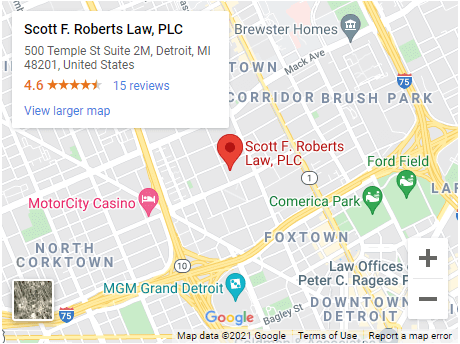When evaluating a Michigan marijuana real estate opportunity, one of the first questions we ask is “is it contingent?” What this question really means is whether the seller will let the buyer back out if they are not able to ensure the necessary approvals or other important items needed to operate on the property. These contingencies can be drafted many ways, with some requiring the buyer to sacrifice part of his or her good faith deposit if they are unable to meet the contingency, and some simply entitling the buyer to a full return of the buyer’s earnest money deposit. How these are drafted depends on how the deal is negotiated and how sophisticated the parties to the transaction are.
Oftentimes, real estate purchase agreements are simply photocopied form contracts that allow you to “check” one or more contingency boxes. These forms are often used to avoid having to involve a Cannabis real estate lawyer in the transaction. While they can sometimes be useful when a buyer wants to put in numerous offers on several parcels of real estate, a tailored and well crafted purchase agreement can save both the buyer the seller a lot of headaches and ensure that each is protected with respect to the proposed transaction. Whether you are the party protected or not may depend on whether you have a real estate attorney on your side that understands the ins and outs of purchase agreements, or if you simply have a broker or agent who only has a cursory understanding of which provisions are important in cannabis real estate transactions.
Contingency provisions are especially important for buyers when you consider the current price of Cannabis properties in Michigan. A property that is in the “green zone” for a provisioning center, for example, might be worth $200,000.00 prior to being zoned in, but listed for a million dollars once the zoning ordinance is passed. With the high multiples being paid by the purchasers of cannabis properties, it is that much more important that the purchaser is protected so that he or she doesn’t get stuck vastly overpaying for a property they cannot operate a marijuana facility on.
Whether you are a real estate broker, buyer, seller or attorney, “contingency” may be one of the most commonly used words in Michigan cannabis real estate transactions today. In this article, we will explore some of the common contingencies used in cannabis real estate transactions, when they should be used as a buyer, and what to look out for as a seller.
The Municipal Approval Contingency
Out of all of the contingencies we utilize when negotiating and drafting real estate purchase agreements in the Cannabis industry, this is the most common. This contingency is also what is being referred to when a cannabis property broker or purchaser asks “is it contingent?” A municipal contingency is a provision whereby the buyer is not obligated to close until they receive municipal approval to operate a marijuana facility, which is sometimes explicitly stated in the purchase agreement or sometimes simply referenced as the purchaser’s “intended use.”
In its most basic form, municipal contingencies are used to ensure that the buyer doesn’t get stuck with the property without being able to operate a licensed marijuana facility on it. As an example, let’s imagine that you wanted to purchase a “green zoned” provisioning center property in Warren, Michigan. Warren had a very competitive provisioning center application process, with only about 20% of the dispensary properties that applied set to receive a provisioning center license. If you were to close on the property prior to approval or denial, instead of having a contingency, then you may have been stuck paying several millions of dollars and still not being able to operate a provisioning center. With a municipal contingency, you would only need to close on the provisioning center property if your municipal license application was approved. If it was not, you could have walked away from the deal, maybe only losing part of your earnest money deposit and some due diligence costs
As the above example illustrates, if the property does not already come licensed, this type of contingency is a must for buyers of cannabis real estate. Even if licensed, buyers may want to nonetheless have the purchase contingent upon the transfer of the license since transferring municipal cannabis licenses is not always a straightforward process.
Due Diligence Contingency
This contingency is also very common to cannabis real estate transactions, and is perhaps the most used contingency in real estate transactions generally. There are several specific contingencies that are often grouped together with the due diligence contingency—e.g. environmental contingencies (i.e. Phase I, Phase II and BEAs), structural or other construction related contingencies (i.e. subject to inspection by a professional building inspector), and so forth.
Basically, a due diligence contingency allows you a certain amount of days—e.g. 30, 60 or 90 days—to investigate the property. Sometimes these provisions are crafted to individual items to be investigated and sometimes these are crafted to be open ended. Either way, these provisions provide the potential purchaser will the ability to back out of the transaction if they discover items during the due diligence process that are not to their liking. When representing the seller, we often try to make the due diligence provision as specific as possible and allow the seller to “cure” any problem the buyer may have with the property. When representing the buyer of a cannabis property, we do the opposite.
Similar to the municipal contingency, what happens to the deposit depends on how the purchase agreement is drafted. It could be drafted to provide the buyer a “free look” at the property, meaning he or she has a certain amount of days to decide whether to move forward, after which the buyer’s earnest money deposit becomes partially or wholly non-refundable. It could also be drafted to become “hard” immediately or after a shorter period of time—e.g. the deposit becomes hard after the first 30 days of a 90 days due diligence period.
Financing Contingency
While common in other areas of real estate, this type of contingency is not too common in cannabis real estate transactions for the simple reason that it is very difficult to obtain financing for cannabis transactions (but not impossible!). In my experience, this contingency is often simply added by the potential purchaser of the transaction to give the purchaser an “out” if they later decide not to close on the transaction. It is also sometimes included simply by mistake—the template the broker, agent or owner used for a prior transaction contains the financing contingency language, and no one knew enough to take it out.
Put simply, a financing contingency in cannabis real estate transactions should be seen as a potential red flag worth looking into. If you are a seller and the buyer includes this language, chances are they just wanted to give themselves an extra “out” if they decide they don’t want to go through with the transaction. While it is possible that the buyer actually has a commitment for debt financing—we work with a handful of lending brokers that specialize in the Cannabis space —this is very uncommon in Michigan marijuana property transactions. As a seller, the presence of this contingency should at the very least trigger further investigation into who the purchaser is working with to finance the transaction and how credible the offer to finance actually is.
Title Work Contingency
If purchasing using a warranty deed, the buyer and seller will almost always engage a title insurance company to “insure” the title of the property. Typically, the seller will obtain a commitment for title after signing the initial purchase agreement, and the buyer will then be given a chance to inspect the title work before agreeing to enter the transaction. Regardless of whether you are the buyer or seller, you will likely want to make sure that the title company you are working with is Cannabis friendly
In most title contingencies, if a buyer sees a title exception they don’t like—e.g. a use restriction, undisclosed easement, a second potential chain of title, etc.—they give written notice to the seller of the specific exception they don’t like. The seller can either “cure” the exception, and if the seller is unable to cure, the buyer is given the choice to either walk away, renegotiate the deal, or move forward with the title defect.
This type of contingency is extremely common in real estate transactions, and virtually a must-have for purchase agreements that transfer the property by warranty deed. Title insurance is generally not too expensive and well worth the protection it provides. However, you do need to be careful that you are not invalidating the terms of the title insurance when you enter into a cannabis transaction. Most title companies will not ensure marijuana property, and if they find out a property they insured is operating as a marijuana facility, they may refuse coverage if a title issue later arises . It is therefore important to work with a cannabis-friendly title company that will stand by its title insurance policy.
Conclusion
Contingencies are an important part of nearly all Michigan cannabis real estate transactions, yet some buyers, sellers and agents will overlook the importance of these provisions in protecting the parties’ interests. For this reason, Michigan cannabis real estate purchasers should ensure that the person handling their transaction is well versed in purchase agreement contingencies. Michigan Cannabis Properties has legal staff at the ready to protect its clients interests and to make sure they are not “caught holding the bag” at the end of a real estate transaction. Mr. Roberts is a Cannabis business and real estate attorney and the managing partner of Scott Roberts Law, a boutique cannabis business law firm.




